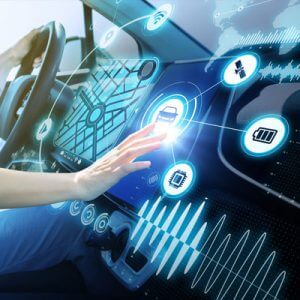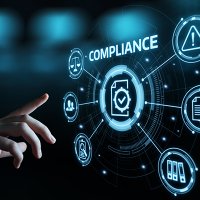Start your Engines: Digital Transformation in the Automotive Industry
 Customer expectations have placed tremendous pressure on automakers to change the way they establish their strategies and manage their organizations. Connected vehicles are a leading area of investment for the auto industry. Before long, every aspect of vehicular transportation will be controlled by telematics and information technology.
Customer expectations have placed tremendous pressure on automakers to change the way they establish their strategies and manage their organizations. Connected vehicles are a leading area of investment for the auto industry. Before long, every aspect of vehicular transportation will be controlled by telematics and information technology.
How IoT Will Make Smart Cars Even More Connected
The connected vehicle offers exciting new digital capabilities for consumers, changing how they use and interact with their vehicles. Automakers are ramping up their connected car efforts for several reasons. Internet connectivity in vehicles allows car companies to release software updates in real time, which is extremely important during a recall. Second, automotive companies can use data from the car to analyze its performance and obtain valuable data on how drivers use their cars. Finally, more connectivity provides more ways for automakers to cross-sell their products and services to customers. For example, connected cars provide detailed real-time information based on vehicle and driver status, geographical position and more, which can be made available to the automakers extended partner network.
A recent Google survey found that 30% of smartphone users get “anxious” without their smartphone on them, and 68% check their smartphones within 15 minutes after waking up in the morning. Connected cars allow people to stay connected more frequently and remove that anxiety. The government is also cracking down on texting while driving, a problem that connected cars would solve by letting drivers keep their hands on the wheel and their eyes on the road even as they communicate with others.
Consumer interest in the connected car is growing, and that will rapidly translate into dollars. Approximately 62% of U.S. consumers were aware of the term “connected car” in a recent AT&T and Ericsson survey. And Google Trends shows the term “connected car” is reaching new highs every month.
With the popularity of the connected car, it’s vital that automakers don’t get left in the dust at the finish line. The necessary technological investments in vehicle connectivity require a host of new partners, and automakers must be increasingly nimble across an ever-more complex network. Automakers must collaborate with partners, suppliers and customers – as well as throughout the enterprise itself. In addition, many new partners are outside the traditional auto industry and include telecommunications, software and content providers, as well as other electronics manufacturers with traditionally faster innovation cycles. Managing complex alliances with companies that don’t have the bulk of their business within the auto industry can be challenging. As services are added from various partners, automakers will want to efficiently engage and disengage new partners, as well as manage a host of alliances in a consistent manner.
Learn how SEEBURGER can help automakers simplify partner, supplier and customer collaboration and onboarding with the SEEBURGER Community Management Application, manage business needs and limitless connectivity with real-time integration with the SEEBURGER API Solution and other integration services using SEEBURGER Business Integration Suite either on-premises or as a cloud service.
Join SEEBURGER at the upcoming Annual Automotive Suppliers Forum 2017 in Gothenburg
Thank you for your message
We appreciate your interest in SEEBURGER
Get in contact with us:
Please enter details about your project in the message section so we can direct your inquiry to the right consultant.
Written by: Ulf Persson
As SVP Strategic Product Management and Analyst Relations, Ulf is responsible for strategic product management, product marketing, global analyst relations and leadership with regards to SEEBURGER integration technology, platform and integration services. This also includes strategic sales and marketing initiatives. Ulf works across multiple industry verticals such as Financial Services/Payments, Automotive, Logistics, Utilities, Retail, CPG and Manufacturing. Ulf has more than 30 years of global business and technology experience working with product and solution delivery of integration technologies (EAI, EDI, B2B, MFT, API, etc.), Analytics and Big Data, Cloud Services, Digital Transformation and various industry initiatives. Before joining SEEBURGER in October 2016, Ulf worked in various global leadership roles with international business integration technology and cloud services providers.





